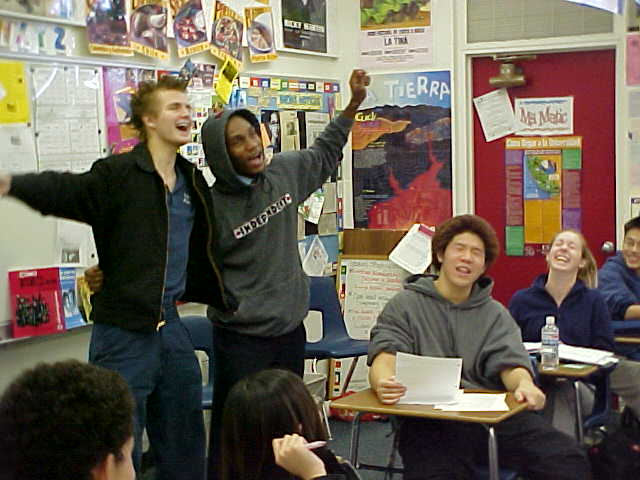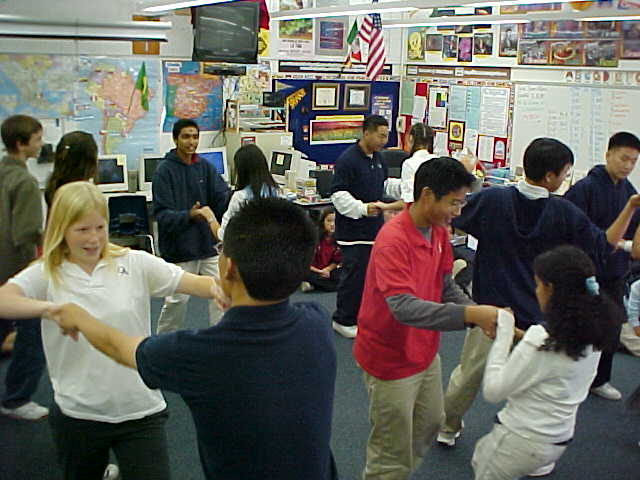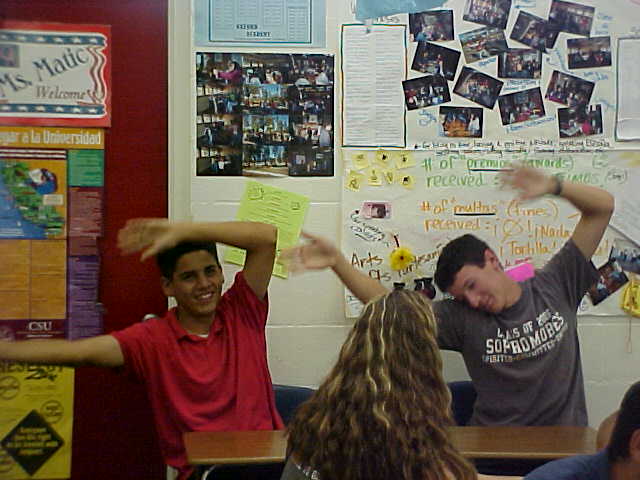

 Juan, Eduardo y Gabriel cantando "Cielito lindo" (2003) |
 |
 Riki y Óscar cantando "Te quise tanto" de P. Rubio (2003) |
STATEMENT OF PHILOSOPHY
Language and communication are at the heart of the human experience. The United States must educate students who are equipped linguistically and culturally to communicate successfully in a pluralistic American society and abroad. This imperative envisions a future in which ALL students will develop and maintain proficiency in English and at least one other language, modern or classical. Children who come to school from non-English-speaking backgrounds should also have opportunities to develop further proficiencies in their first language.
Supporting this vision are three assumptions about language and culture, learners of language and culture, and language and culture education:
Competence in more than one language and culture enables people to
APPROACH AND METHODS
Studies show that multiple exposure to comprehensible input is the basis for acquiring proficiency in a second language. Retention of new material is increased by frequent use of learned vocabulary in meaningful, personalized contexts. Students will be exposed to Spanish through cassette- and video-tape examples of native speakers in contextualized situations; authentic samples of modern and folklore music from a variety of Spanish-speaking countries; in-class immersion in Spanish; authentic reading materials, such as short stories, poetry, newspaper and magazine articles, menus, brochures, etc.; reading passages in the class text; and oral interviews during "guest appearances" from native Spanish speakers. Students will personalize the newly learned material by creating dialogues, or skits, and also art and video projects that synthesize their creativity and the new structures practiced in class. The projects and presentations will allow students to share their interests and opinions with the entire class in an engaging and memorable way, while building and refining their public speaking skills.
I tend to incorporate a variety of teaching approaches and methods into my daily lessons, as I believe in the notion that there are different ways of learning a concept and students with different "intelligences," as Gardner put it in his Multiple Intelligences: The Theory in Practice (BasicBooks, 1993).
ON LANGUAGE LEARNING ABILITY
I am more of a rationalist than an empiricist in that I believe "humans have an innate capacity for the development of language... (and are) genetically programmed to develop our linguistic systems..." (Teaching Language in Context, Omaggio Hadley, Heinle & Heinle Publishers, 1993.)
I support the notion that bilingualism should be promoted and developed from an early age, and I consider the United States to be one of the worst, and best, countries in the world as far as language acquisition is concerned. It is the best because of the numerous opportunities for practice and purposeful use of the languages we are studying or learning, present in our multi-ethnic and multi-lingual societies. Whether or not we choose, as individuals, to take advantage of those opportunities is altogether another matter. In my opinion, far too many people avoid approaching and learning about the many different ethnic enclaves in the U.S. for a variety of reasons, including but not limited to personal prejudices or ignorance. For its misuse and disrespect of resources, I consider the U.S. one of the worst-off countries in the world, linguistically speaking.
In our global and increasingly interdependent world, I believe that the hypocritical practice of "separate but equal" that we so commonly see around us must be changed, and eventually will be changed, even if only for economic purposes. Separate means separate, and inherently unequal. But I would imagine that this will become all too clear to us when those who are separated and commonly refered to as "minorities" become the majority in population within the next couple of decades. This will bring changes in many facets of our society, which I won't go into at present. My goal in teaching Spanish at the high school level is to equip my students with language skills and cultural knowledge and understanding that they can take with them into their adulthood, so that they are prepared to successfully live in the changing face of today's society with respect, acceptance (not tolerance), and understanding of what their place is within our ethnically diverse local communities.
It is from this stand-point that I plan to teach my Spanish classes. I hope to open up unexplored worlds for my students, and to present them with today's contemporary Latin America and Spain along with important historical forces that have changed the faces of Spanish-speaking countries throughout their relatively brief histories. I hope to expand the students' horizons so that they base their opinions on the complex whole, rather than on the seemingly homogenous (Spanish-speaking) immigrant population that is a common part of their everyday lives in Southern California.
In short, Spanish class is about more than mariachis, Taco Bell, bull fights, and foreign food aisles in the grocery stores. It's about people with whom my students will probably be surprised to realize how much they have in common. It's about a rich and diverse history that spans across four continents and twenty one countries. It's about family practices and respect, not necessarily admiration, for differences. It's about getting facts directly from the source, in the native language of the people, and formulating an educated and critical opinion based on all of the information, not just what CBS or NBC has deemed newsworthy. Perhaps most importantly, it is about conversing and expressing oneself in an educated and poised manner in one of the fastest-growing languages in our society today.
I believe these are skills that will be extremely useful throughout my students' lives, no matter what their chosen profession will be or where they may choose to reside.
I welcome the challenge of guiding the students in their Spanish language acquisition. I am also open to any comments or questions you have for me, communicated either in a pre-scheduled conference, by phone, or via email at SraMatic@hotmail.com.
PROFESSIONS STRENGTHENED WITH SPANISH SKILLS
TopLanguageJobs.co.uk /
Bilingual-Jobs.com
(From the National Standards for Foreign Language Learning)
All students can be successful language and culture learners, and they
Language and culture education is part of the core curriculum, and it
Brochures Promoting Language Study
at the Modern Languages Association website.
Hispanic-Jobs.com /
BilingualJobs.net
BilingualCareer.com
(Knowing Spanish is essential in any profession, especially in metropolitan cities.) 
